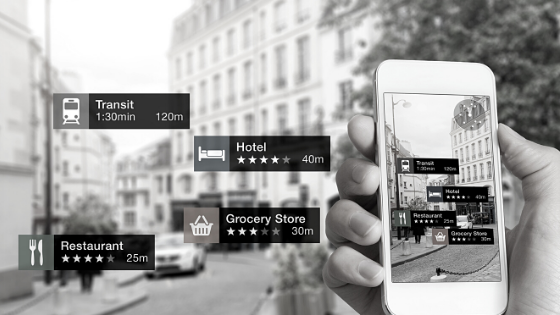In recent years Augmented Reality has made a huge impact on our daily lives. Now the traditional idea that this technology is only used for games or other entertainment applications has changed. Augmented Reality has been embraced by various kinds of industries. The potential that this technology carries has made it easily adoptable by businesses of various fields, ranging from those with educational, productivity to medical purposes. Let’s take a look below to learn more about some of the most prominent industries that have chosen to incorporate this technology as part of their operating processes.

-
Manufacturing
When we talk about the manufacturing industry we always keep in mind that even the smallest mistakes can cause interruptions of the whole process. The complex tasks that this industry has, require precise and accurate decisions in a very fast time. Thanks to the Augmented Reality technology, empowerment of the workforce with remote support is possible. This enhanced remote support makes it possible in real-time for the most capable experts to give instructions to site workers who encounter many problems during production processes, mainly with the many machines used in this industry. Through AR remote assistance it is possible to reduce machine downtime through the efficient solutions found making it possible to save thousands of dollars that could be lost.
-
Mining
As mining is a very delicate industry, the inspection of machinery and the working environment is an important process that follows many subsequent procedures. Augmented Reality makes it possible for the centre experts to inspect from a distance virtually all the machines as well as the surrounding environment. In addition, through the smart glasses and the zoom-in / out feature, every detail is displayed, including the dangerous areas, but always maintaining the safety of the workers. So, thanks to this technology, many critical situations that can arise are avoided, thus facilitating the work of the site workers.
-
Maritime
Augmented Reality is showing great opportunities to help the maritime industry to overcome the challenges it is facing especially in maintenance, remote assistance, inspections, and workforce training. We can say that the training of employees operating offshore is extremely important. Through AR remote assistance, centre experts can provide real-time training to current inexperienced employees on more complex issues. Although located offshore, employees through this distance training become better prepared for unforeseen situations that may arise in the future.
-
Insurance
The insurance sector is mainly concerned with complex processes, often critical and unexpected situations occur and in such cases, immediate customer support is required. Insurance companies that normally operate and also deal with property or vehicle insurance definitely need to send an insurance agent to inspect and assess the damage. Now through AR remote assistance all the inspections can be done in real-time and reducing the time and cost that sending the agent to the clients may require. Through this technology, the whole process of inspection and damage assessment is done in a faster and simpler way. This whole process can even be documented for later purposes. At the same time, this technology makes agents virtually closer to customers, significantly improving customer service and their satisfaction.
-
Education
AR technology is making a difference in the field of education by engaging more the education staff but at the same time students as well. In addition to the fun sphere making the educational environment more attractive, at the same time, it gives teachers the opportunity to present real situations through 3D modelling. In this way, the information passed on to the students is easier, perceptible, and understandable. This kind of explanation of different topics, in addition to making students more interested in lessons, replaces the traditional way of learning. This gives the opportunity to create a more informed and knowledgeable generation for the future. Even empowered games through this technology make students more engaged, especially in the theoretical hours of physical education, thus promoting an active and healthy life.
-
Healthcare
The healthcare industry is embracing and interacting with AR as a tool that helps to improve the education not only of the medical staff but also of the patient. Initially, AR helps medical students who need to learn a great deal of information about anatomy and how the body works. They are able to see different 3D models thus being able to learn every body function in detail as well as be taught to find solutions to problems given through stimulus tests. At the same time, this AR technology also helps specialised doctors by facilitating those numerous work processes. Usually, surgeons are using AR as a tool that enables the modelling of three-dimensional representations of patient anatomy. From this application, we have an easier process of visualising the area where the surgery will be performed and impacting the accuracy for a satisfactory result for the patient.
-
Travel
Another area where this innovative technology is being used is travel. Making the tourist experiences even more special, AR technology is being widely embraced in many countries. Thanks to this technology, tourists now have access to tourist information and guides not only in the written version but also in the form of audio, making it even easier to explore tourist spots. Another special feature is the 360-degree tours that are easily accessible, thus making it possible to virtually explore a place before visiting reality. This technology is not only used by travel agencies but now also by restaurants and hotels that offer virtual tours of their facilities, giving guests a virtual experience of what to expect.
-
Supply Chain
Inventory management is a significant factor in the supply chain. Augmented Reality by adding a virtual experience on top of inventory data helps businesses and provides field workers instructions for step-by-step container loading and tracking different procedures. In addition, smart glasses integrated with AR remote assistance provide hands-free task performance. Users can work with their heads up and they are less likely to be distracted or injured. Improved safety increases and training cost and downtime are reduced at the same time.
What we mentioned above are just some of the industrial areas where Augmented Reality technology is contributing extensively to facilitate all industrial processes and is adding value to businesses operating in different sectors. We can say that this technology is establishing a new order in the business world by improving the way companies interact with customers and at the same time being the right tool to increase employee engagement effectively. As this technology continues to revolutionise the world, all businesses are encouraged to adopt it as a tool that offers many long-term benefits.



















